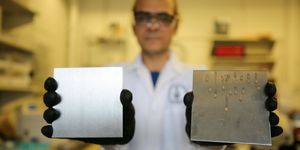As Earth Warms, Soil 'Breathes' Harder
It’s been established that the carbon dioxide in our atmosphere has reached unprecedented levels, and that is causing temperatures around the world to rise. There are a variety of factors contributing to those levels, and one of them seems to be microbes that live in soil. There are vast numbers of microorganisms in our environment, and one thing they like to eat is decaying plant material that is loaded with carbon. After they metabolize it, carbon dioxide from those bacteria enters our atmosphere. Scientists studying this phenomenon have learned more about it, and have reported their findings in Nature.
Sometimes thought of as a kind of breathing, soil respiration refers to the processing of carbon by microbes, which take it in and ‘breathe’ it out. The researchers found that microorganisms have been processing carbon faster, transferring it from the soil into the atmosphere at a rate that went up 1.2 percent over 25 years, 1990 to 2014.
A little over one percent sounds like only a tiny bit, but when considering the number of microbes over the whole planet, that is a huge amount for such a short period. It was also verified at many sites around the world, by hundreds of scientists. It's also consistent with predictions about how soil microbes might react to an increase in temperature.
"It's important to note that this is a finding based on observations in the real world. This is not a tightly controlled lab experiment," noted first author Ben Bond-Lamberty of the Joint Global Change Research Institute, a partnership between the Department of Energy's Pacific Northwest National Laboratory and the University of Maryland.
"Soils around the globe are responding to a warming climate, which in turn can convert more carbon into carbon dioxide which enters the atmosphere. Depending on how other components of the carbon cycle might respond due to climate warming, these soil changes can potentially contribute to even higher temperatures due to a feedback loop," he added.
Related: Understanding How Microbes Accelerate Climate Change
There's twice as much carbon in the world's soil as there is in the air. Scientists have known that their behavior will be a factor in future climate change; they created networks and studied satellite data to learn more. Encompassing over 1,500 sites worldwide, The Global Soil Respiration Database gathers data on how soil deals with carbon. Information such as rainfall and temperature is recorded at 500 towers globally by FLUXNET.
"Most studies that address this question look at one individual site which we understand very well," said author Vanessa Bailey, a soil scientist. "This study asks the question on a global scale. We're talking about a huge quantity of carbon. Microbes exert an outsize influence on the world that is very hard to measure on such a large scale."
It has been suggested that soil respiration will increase as global temperatures rise. A team lead by Bond-Lamberty studied how plant growth and microbial behavior contributes.
The researchers found that the contribution of soil respiration to carbon is exceeding plants’ ability to absorb it. As temperatures rise, it will only get worse.
"We know with high precision that global temperatures have risen," said Bond-Lamberty. "We'd expect that to stimulate microbes to be more active. And that is precisely what we've detected. Land is thought to be a robust sink of carbon overall, but with rising soil respiration rates, you won't have an intact land carbon sink forever."
This video from Boston University deals with soil respiration and climate change.
Sources: AAAS/Eurekalert! Via DOE/Pacific Northwest National Laboratory, Nature









